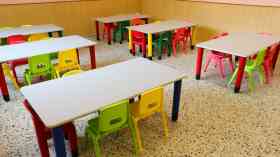
The importance of the fire alarm log book in schools
Familiarity with fire drill procedures should be a prominent aspect of a teacher’s knowledge of the school. Catherine Nelms, of the Fire Industry Association, outlines why using the fire alarm log book is vital for schools across the country.
As we all know, fire drill practice in schools is an absolute must. Teachers must become familiar with the procedures, and children must learn to walk silently from the building to the agreed place of safety. This is also an opportunity for staff to ensure that life safety equipment is working properly. Generally, on the whole, most schools are good at training the children how to behave during a fire drill and things progress without a hitch so that everyone can file slowly back inside.
However, fire safety is not a matter to be dismissed. Serious breaches of the Regulatory Reform (Fire Safety) Order 2005 (or RFO, for short) can have huge implications for schools, with one state school fined £8,000 in 2009 for a breach of just three fire safety regulations. Another independent school was fined £50,000 for a breach of 15 fire safety regulations in 2011. These might be historic cases, and thankfully, it seems that cases where schools do breach the regulations are becoming increasingly rare, but that does not mean that the vigilance upheld by schools can now be relaxed.
Current legislation states that the ‘responsible person’ must take all steps to demonstrate that they have followed all regulations in order to prevent a fire. A ‘responsible person’, according to the RFO, means: (a) in relation to a workplace, the employer, if the workplace is to any extent under his control; (b) in relation to any premises not falling within paragraph (a)— (i) the person who has control of the premises (as occupier or otherwise) in connection with the carrying on by him of a trade, business or other undertaking (for profit or not); or (ii) the owner, where the person in control of the premises does not have control in connection with the carrying on by that person of a trade, business or other undertaking.
Who is responsible?
In the instance of a school, the issue of the ‘responsible person’ can get a little complex. Essentially, the ‘responsible person’ may not be a person as such, but the corporate body as a whole that could be penalised by any potential breaches of fire safety regulations. For schools within an academy chain, that could be the academy body itself, whilst for schools still owned by the Local Education Authority (LEA), it is likely to be the LEA. The issue gets a little easier for independent schools as the responsibility would lie directly with the school itself.
However, according to Article 13 of the Regulatory Reform (Fire Safety) Order, the ‘responsible person’ (i.e. the LEA, the academy chain, or independent school) must nominate a competent individual on-site for the general day-to-day management of fire safety.
This could be a facilities manager, site manager, caretaker, head teacher, or a deputy head who might oversee the general running of fire safety, or a combination of these people. British Standards (which aren’t laws but are general best practice guides written by industry experts, such as members of the Fire Industry Association) refers to this role as the ‘premises management’ to distinguish from responsible person defined in the RFO. Again premises management may be a single person or a team of people.
Most schools nominate someone within Premises Management to be ‘Fire Officer’ to oversee all of the management in relation to fire in order to ensure compliance with the law. The Fire Officer would also be responsible for training other staff in the event of an alarm sounding.
Maintenance of equipment
Whilst many schools have a robust fire safety policy in place to train staff and to manage the fire drills, it is important to consider the proper maintenance of the fire alarm system, and all equipment such as fire extinguishers. Routine and regular maintenance is an essential part of ensuring that the system continues to be fully operational in its life safety role. It’s vital that these do not get overlooked.
In a school setting where potentially hundreds of children are in the care of all adults around, it really isn’t acceptable to allow any part of the fire detection and alarm system go unmaintained for any great length of time. The log book is the most essential document required to record fire safety events, and it is the job of the Premises Management or ‘Fire Officer’ to keep this up-to-date.
What is a log book?
Quite simply, a log book is a record (or log) of everything related to fire safety in the building, kept up-to-date by the Premises Management (likely to be the school’s Fire Officer for the general day- to-day tasks). It should contain the date, time, and the reason for the alarm sounding. Was it a false alarm? Was it a weekly test or fire drill? Was it a real fire and did somebody get hurt? What device caused the alarm? All of these aspects should be recorded.
A log book is not the sort of document that can just be written at the back of a school exercise book, as there are certain requirements in the types of information that should be recorded. At the Fire Industry Association (FIA), we always recommend to schools that when they commission the fire alarm system, that they ask for the log book to be included in the package. Any decent, reputable, certified company should be able to do this, and they should be able to give the best advice on how to use the document when they hand over all other documentation relating to the fire alarm system.
The important thing to consider is where to keep the log book, as it is a vitally important document that needs to be kept to hand to record any fire drills, fire alarm tests, or false alarms. Keeping the log book locked up away from children is sensible, as is keeping the log book close to the fire alarm panel. The panel will normally show that everything is normal and only a single green LED is lit. Otherwise LED indicators will show if there is a fault, disablement, test, or even if there is a fire. Any faults should be recorded in the log book.
It’s vital to remain disciplined when it comes to fire safety. Organise weekly fire alarm tests, activating the alarm from a different manual call point (the red button that activates the alarm) every time. Larger schools are obviously more likely to have more call points, and a system should be developed to ensure that every call point is tested over the course of the year.
All of this should be recorded into the log book of the specific call point used, the date, time of activation, and if all the alarms sound successfully. For larger systems it may take considerable time for the Fire Officer to test every manual call point, perhaps several years. However, remember that this in-house weekly testing is supplemented by the professional maintenance regimes that will ensure that every component of the fire detection and alarm system is tested over a period of 12 months.
As schools can vary massively in size and spread of buildings, it is important to ensure that all staff are kept vigilant. At the FIA, we recommend that when premises management conduct the weekly test, all teachers and support staff should pay attention and notice any changes. If a fire alarm does not sound, or sounds different to normal, perhaps at a different volume level, then this should be reported to the premises management as soon as possible. This of course will be recorded into the log book.
If you are starting to spot a pattern here, then you’d be right: every time anything at all happens to the fire alarm system (including a false alarm), this should be recorded into the log book. This includes the periodic inspection by the alarm maintenance company who should come in every six months unless risk assessment recommends a more frequent attendance. Within the year every part of the fire alarm system should be tested to ensure the system is fully operational. Often this is arranged to take place during the school holidays where the school is minimally occupied.
Checking the panel
It is easy to overlook, but the fire alarm panel should be checked every day (perhaps before the children arrive) to ensure that everything is normal and that no faults or abnormal conditions are being reported. Any anomalies should be recorded in the logbook and the maintenance company contacted to rectify the situation as soon as possible.
In the instance of a fault the fire alarm maintenance company will best be able to advise of the consequences of a fault condition and the level of urgency required to resolve the problem. They will normally be contracted to attend within 24 hours of receiving a report of a problem. In the meantime, it may be necessary to implement some form of fire watch to maintain sufficient fire safety or even be necessary to evacuate a part of the building that no longer has adequate fire monitoring.
As ever, using common sense about likely best practice and following your fire risk assessment stringently will keep things running smoothly.
Further Information
www.fia.uk.com
Latest News
19/12/2025 - 09:54
The Education Committee has expanded its ongoing inquiry into the early years sector to examine how safeguarding can be strengthened in early years settings.
18/12/2025 - 09:25
The UK will be rejoining the Erasmus programme in 2027, following a package of agreements with the EU.
17/12/2025 - 09:31
Ofqual has fined exam board Pearson more than £2 million in total for serious breaches in three separate cases between 2019 and 2023 which collectively affected tens of thousands of students.
16/12/2025 - 09:19
The average funding rates will increase by 4.3% for under 2s, and by almost 5% for 3-and-4-year-olds.
15/12/2025 - 10:30
Local colleges are set to receive £570 million in government funding to expand training facilities in areas such as construction and engineering.







